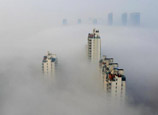
Bare-chested protests
On Nov 29, some 20 male research and development engineers who were part of the group forced to go "on vacation" staged a protest at Sinovel's Beijing headquarters, standing bare-chested in the snow to attract public attention.
The company also cancelled prospective employment agreements with a number of graduates in 2012, including Yin Wei, aged 24. After four years of studying at North China Electronic Power University in Beijing, one of China's leading schools in the power industry, Yin felt his employment prospects were good and signed an agreement with Sinovel in September 2011, when many of his peers were just starting to search for jobs. Sinovel offered an annual 3,000 yuan for interns and around 2,000 yuan more for full employees, a salary that satisfied Yin.
However, in May 2012, as Yin was celebrating graduation with friends, he was told the agreement had been terminated. With compensation of 2,000 yuan, Yin and two classmates were forced to return home to find jobs.
"I was confident and proud to be a member of Sinovel at first, but the cancellation (of the agreement) changed my career and life," said Yin. "It was too late to find a high-quality position, because most companies had completed their recruitment by May."
Eventually, Yin found a job with a transmission-tower manufacturer in his hometown of Chengdu, capital of Sichuan province. "I'm extremely interested in facilities research and development, but in the new factory I can't choose what I do, and my gross salary is no more than 2,000 yuan a month, a mere 40 percent of what I had expected," he said.
A member of Sinovel's press relations team declined to answer questions put to her by China Daily.
"Sinovel has made great forward strides in the past few years, but the foundation of its development is not solid enough," said Ma Xuelu, vice-chairman of the China Wind Energy Association. "The company focused on expanding production capacity rather than making the necessary technical innovations. This is a typical phenomenon in the Chinese wind power industry."
In addition to the lack of innovation, the adjustment of industrial policies, and fierce competition, are also blamed for the sectoral profit slump.
Also, a number of local governments that approved wind farm construction to pursue GDP growth have ignored the fact that the local grid network lacks the capacity for long-distance power transmission.


















 Why supervision on 'drug chicken' lacks intensity?
Why supervision on 'drug chicken' lacks intensity?


![]()
